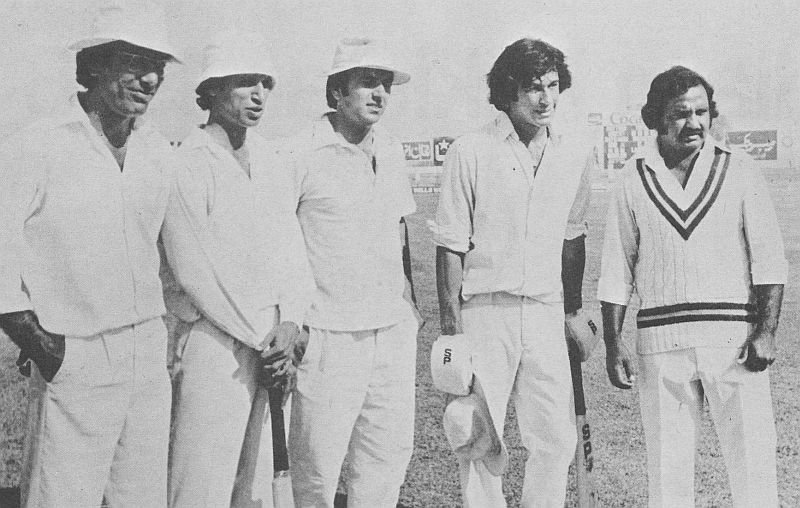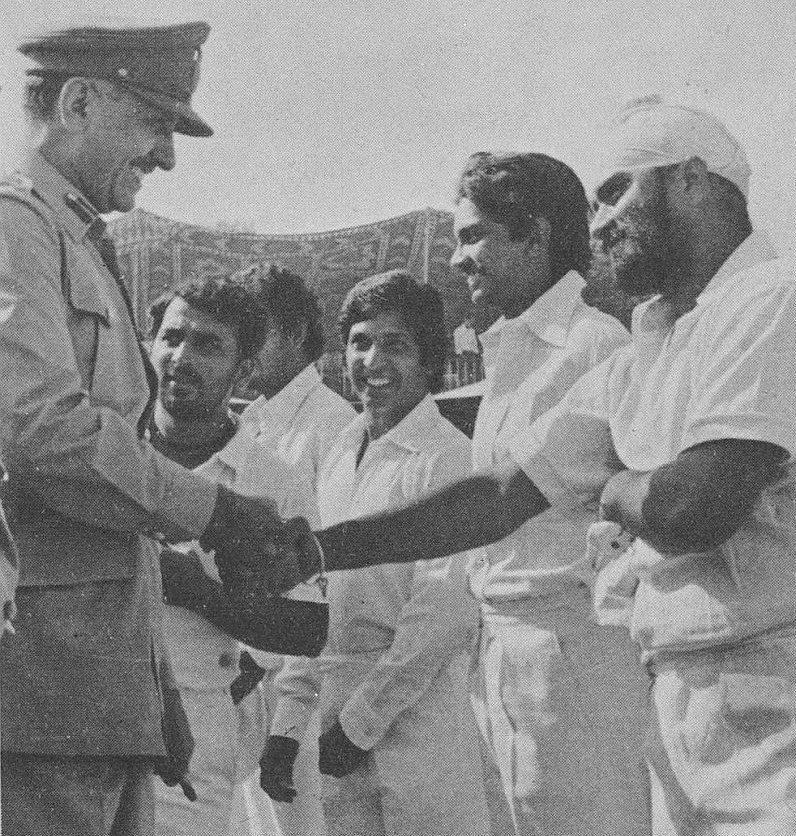Hussain Syed reports on the Pakistan vs India First Test at Faisalabad in 1978, but yet another boring draw. A new test venue, a new cricket administration, a new technical committee under Hanif Muhammad, and the inclusion of five Packer players all failed to prevent the First Test match between India and Pakistan at Faisalabad from becoming the 14th consecutive drawn Test between the two countries. This was the 17th Test, and only the first three have produced results—two having been won by India and one by Pakistan.
Extensive press and radio coverage of the pre-test fixtures had generated tremendous interest. Everybody was talking about how Pakistani pacemen would demolish Indian batsmen, how Indian spinners would be a tough proposition for Pakistan batting, and how the series was going to be decisive because both Mushtaq Muhammad and Bishan Singh Bedi had promised results. In the event, the first test turned out to be one of the tamest draws.
There were numerous records, including Zaheer Abbas’s first Test century at home and Pakistan’s highest total against India. Mushtaq’s decision to bat after calling correctly was not unexpected, but what surprised many was the life that Indian medium-paced bowler Kapil Dev was able to extract from the newly-prepared wicket, forcing Majid Khan to duck and Sadiq Muhammad to use the helmet.
Lala Amarnath, when asked to comment on Sadiq’s use of a helmet against the Indian pace attack, was blunt enough to remark, ‘I would have played without anything against a pace attack of this nature’. The dismissal of Sadiq Muhammad and out-of-form Mushtaq Muhammad within the space of 26 runs caused the only scare in Pakistan’s dressing room.
Zaheer Abbas until now had not scored many runs in Test matches in Pakistan, though he had confidence before the Test that he would remove this stigma’ during the present series. He and Javed Miandad started slowly but confidently against the Indian spinners, and soon Zaheer Abbas was at his brilliant best. His off-roading could not have been surpassed, and anything short was pulled savagely. I have seen Zaheer Abbas play some fine innings all over the world, but this was certainly his greatest.
Javed Miandad, himself a flamboyant stroke player, could only act as a second fiddle. Their fourth-wicket partnership of 255 was a record. When Mushtaq Muhammad declared Pakistan innings at tea on the second day, the psychological advantage of making the Indians chase a huge total was certainly an added bonus. Sunil Gavaskar and Chetan Chauhan refused to be overawed, and after Sadiq had missed an easy chance off Gavaskar, the pattern for a draw was set.
Sunil Gavaskar, while grafting his way to 89, never allowed the Pakistani pace attack to get on top. His brother-in-law, Vishwanath, picked up where Gavaskar left off. His timing of the ball on the rise was breathtaking. Pakistan led by 41 with approximately eight hours’ play left. The remaining play was a mere formality. In five days of cricket, 1,272 runs had been scored for the loss of only 21 wickets—a sad reflection on the whole affair. As someone observed, a monument ought to be erected at the site in memory of those bowlers who had sweated their hearts for such modest returns.
Records:
Faisalabad new test center, 40th in tests and the eighth test venue in Pakistan, fell in line with the tradition in Pakistan. Except for Rawalpindi, the inaugural tests in all seven other test venues were drawn. At Rawalpindi, Pakistan won the only Test they hosted there against New Zealand in 1964–65. Bahawalpur, Dacca, Hyderabad, and Karachi. Lahore, Peshawar, and now Faisalabad have all had a drawn inaugural test.
An interesting coincidence relates to the day the test began. India and Pakistan inaugurated test ties between them on October 16, 1952, in New Delhi. After a lapse of 17 years, the bonds of cricketing relations were further strengthened on the same day, October 16, a full 28 years after the first Test encounter.
The 255-run fourth wicket partnership between Zaheer Abbas and Javed Miandad is not only the best for the fourth wicket for Pakistan in Indo-Pak Tests, but it is the highest for any wicket on either side in Indo-Pak cricket, beating the earlier record stand of 246 for the second wicket between Hanif Mohamad and Saeed Ahmed at Bombay in 1960-61.
Pakistan, in amassing a total of 503 for 8 wickets declared, recorded their highest total against India, and India, in putting up a total of 462 for 9 wickets declared, registered their highest against Pakistan in Pakistan.
Pakistan conceded 40 extras, consisting of four byes, two leg byes, and as many as 34 no balls (15 bowled by Imran Khan, 13 by Sarfraz Nawaz, three by Sikander Bakht, and three by Mushtaq Muhammad), thus breaking their previous record of 34 extras conceded in Bombay in 1960–61.
Pakistan made their 37th declaration (seventh against India), while India’s declaration was their 36th (fourth against Pakistan). Among those who reached important milestones in their careers in this test were Bishan Singh Bedi and Mushtaq Muhammad. Bishan Singh Bedi played in his 59th Test, equaling Polly Umrigar’s record number of appearances for India. Mushtaq Mohammad played his 50th Test.
Javed Miandad crossed the 1000-run mark with his seventh run in his 14th Test. Just as Viswanath reached his career best of 145, improving upon his earlier best of 139 made against the West Indies at Calcutta in 1974–75, Dillp Vengsarkar also bettered his own mark of 78 made at Adelaide last season by playing a stubborn innings of 83.
Zaheer Abbas, in piling up 176, created a new highest mark for Pakistan against India, erasing Hanif Muhammad’s 160 made in Bombay in 1960–61.
The good start of 97 given by India’s opening pair, Sunil Gavaskar and Chetan Chauhan, set aside the earlier stand of 84 put on by M.L. Jaisimha and skipper Nari Contractor at Madras in 1960–61.
It was only the second occasion when Sunil Gavaskar and G. R. Viswanath had a 100-run partnership. Before their 101-run third wicket stand in this Test, the two world-class batsmen had put on 122 for the third wicket in the Georgetown Test in 1970–71, which was the first Test in which they played together.
The Faisalabad Test will be remembered for one more rare event. Both sides possessed a pair of brothers, Mushtaq Muhammad and Sadiq Muhammad on the Pakistani side, and Mohinder and Surinder for India. Pakistan’s pair of Mushtaq Muhammad and Sadiq Muhammad had opposed Australia’s pair of lan Chappell and Greg Chappell in all three Tests in Australia in 1972–73. And just as the elder brother, lan Chappell, was the captain of the home team, Mushtaq, the elder brother of Sadiq Muhammad, was the captain of Pakistan.



